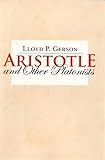Aristotle and Other Platonists / Lloyd P. Gerson.
Material type: TextPublisher: Ithaca, NY : Cornell University Press, [2017]Copyright date: 2006Description: 1 online resource (348 p.)Content type:
TextPublisher: Ithaca, NY : Cornell University Press, [2017]Copyright date: 2006Description: 1 online resource (348 p.)Content type: - 9781501716966
- 185 22
- B485 .G43 2005eb
- online - DeGruyter
| Item type | Current library | Call number | URL | Status | Notes | Barcode | |
|---|---|---|---|---|---|---|---|
 eBook
eBook
|
Biblioteca "Angelicum" Pont. Univ. S.Tommaso d'Aquino Nuvola online | online - DeGruyter (Browse shelf(Opens below)) | Online access | Not for loan (Accesso limitato) | Accesso per gli utenti autorizzati / Access for authorized users | (dgr)9781501716966 |
Browsing Biblioteca "Angelicum" Pont. Univ. S.Tommaso d'Aquino shelves, Shelving location: Nuvola online Close shelf browser (Hides shelf browser)

|

|

|

|

|

|

|
||
| online - DeGruyter School of Europeanness : Tolerance and Other Lessons in Political Liberalism in Latvia / | online - DeGruyter Currencies of Imagination : Channeling Money and Chasing Mobility in Vietnam / | online - DeGruyter Imagining World Order : Literature and International Law in Early Modern Europe, 1500–1800 / | online - DeGruyter Aristotle and Other Platonists / | online - DeGruyter Thinking in Time : An Introduction to Henri Bergson / | online - DeGruyter Reflections on Liszt / | online - DeGruyter Immigration Policy and the Challenge of Globalization : Unions and Employers in Unlikely Alliance / |
Frontmatter -- Contents -- Acknowledgments -- Introduction -- 1. What Is Platonism? -- 2. The Exoteric Writings and the Early Aristotle -- 3. The Categories of Reality -- 4. Nature and Its Principles -- 5. Psychology: Souls and Intellects -- 6. Aristotle’s Metaphysics -- 7. Aristotle and the Forms -- 8. Aristotle’s Ethics -- 9. Aristotle: Platonist malgré lui? -- Appendix: Platonists and Other Aristotelians -- Bibliography -- General Index -- Index Locorum
restricted access online access with authorization star
http://purl.org/coar/access_right/c_16ec
"Aristotle versus Plato. For a long time that is the angle from which the tale has been told, in textbooks on the history of philosophy and to university students. Aristotle's philosophy, so the story goes, was au fond in opposition to Plato's. But it was not always thus."—from the IntroductionIn a wide-ranging book likely to cause controversy, Lloyd P. Gerson sets out the case for the "harmony" of Platonism and Aristotelianism, the standard view in late antiquity. He aims to show that the twentieth-century view that Aristotle started out as a Platonist and ended up as an anti-Platonist is seriously flawed. Gerson examines the Neoplatonic commentators on Aristotle based on their principle of harmony. In considering ancient studies of Aristotle's Categories, Physics, De Anima, Metaphysics, and Nicomachean Ethics, the author shows how the principle of harmony allows us to understand numerous texts that otherwise appear intractable. Gerson also explains how these "esoteric" treatises can be seen not to conflict with the early "exoteric" and admittedly Platonic dialogues of Aristotle. Aristotle and Other Platonists concludes with an assessment of some of the philosophical results of acknowledging harmony.
Mode of access: Internet via World Wide Web.
In English.
Description based on online resource; title from PDF title page (publisher's Web site, viewed 26. Aug 2024)


